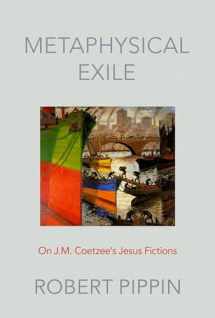
Metaphysical Exile: On J.M. Coetzee's Jesus Fictions
Book details
Summary
Description
Nobel Prize-winning novelist J.M. Coetzee's "Jesus" fictions constitute a trilogy of novels that have appeared over the last decade. They stand out from his earlier work in their difficulty, and in the central role they accord philosophy--in part through their interest in specific themes in
which philosophy is interested, in part through their critical engagement with philosophy as a mode of intellectual activity, with a very particular role to play in the broader cultural concerns of modern Western Europe.
Robert Pippin presents the first detailed interpretation of J.M. Coetzee's "Jesus" trilogy as a whole. In order to understand them, he treats the three fictions as a philosophical fable, in the tradition of Plato's Republic, More's Utopia, Rousseau's Emile, or Nietzsche's Thus Spoke Zarathustra. In
the trilogy's mythical setting, everyone is an exile, removed from their homeland and transported to a strange new place, with most of their memories of their homeland erased. Pippin treats these fictions as philosophical explorations of the implications of a deeper kind of spiritual homelessness--a
version that characterizes late modern life itself--and he sees the theme of forgetting as a figure for modern historical amnesia and indifference to reflection and self-knowledge. This state of exile is interpreted as metaphysical as well as geographical.
Pippin's insightful, careful reading of Coetzee suggests the limitations of traditional philosophical treatments of themes like eros, beauty, social order, art, family, non-discursive forms of intelligibility, self-deception, and death. And he wrings from the trilogy its intertextuality, and many
references to the Christian Bible, Plato, Cervantes, Goethe, Kleist, and Wittgenstein, among others. Throughout, Pippin expresses the potential of literature to be a profound form of philosophical reflection.


We would LOVE it if you could help us and other readers by reviewing the book
Book review



